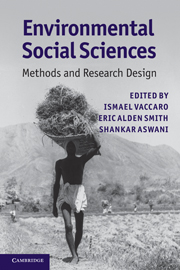Book contents
- Frontmatter
- Contents
- Contributors
- Foreword
- Preface
- 1 Introduction
- 2 People, numbers, and natural resources: demography in environmental research
- 3 Production decisions and time allocation: a guide to data collection
- 4 Analyzing the politics of natural resources: from theories of property rights to institutional analysis and beyond
- 5 Extreme events, tipping points, and vulnerability: methods in the political economy of environment
- 6 Local communities and natural resources: ethnobiology in practice
- 7 Mapping histories: cultural landscapes and walkabout methods
- 8 Metaphors and myths in news reports of an Amazonian “Lost Tribe”: society, environment and literary analysis
- 9 Water decision-makers in a desert city: text analysis and environmental social science
- 10 Linking human and natural systems: social networks, environment, and ecology
- 11 Khat commodity chains in Madagascar: multi-sited ethnography at multiple scales
- 12 Spatiotemporal methodologies in environmental anthropology: geographic information systems, remote sensing, landscape changes, and local knowledge
- 13 Deep time, diachronic change, and the integration of multi-scalar data: archaeological methods for exploring human–environment dynamics
- 14 Comparing trajectories of climate, class, and production: an historical ecology of American yeomen
- 15 Socioecological methods for designing marine conservation programs: a Solomon Islands example
- Index
- References
4 - Analyzing the politics of natural resources: from theories of property rights to institutional analysis and beyond
Published online by Cambridge University Press: 05 June 2012
- Frontmatter
- Contents
- Contributors
- Foreword
- Preface
- 1 Introduction
- 2 People, numbers, and natural resources: demography in environmental research
- 3 Production decisions and time allocation: a guide to data collection
- 4 Analyzing the politics of natural resources: from theories of property rights to institutional analysis and beyond
- 5 Extreme events, tipping points, and vulnerability: methods in the political economy of environment
- 6 Local communities and natural resources: ethnobiology in practice
- 7 Mapping histories: cultural landscapes and walkabout methods
- 8 Metaphors and myths in news reports of an Amazonian “Lost Tribe”: society, environment and literary analysis
- 9 Water decision-makers in a desert city: text analysis and environmental social science
- 10 Linking human and natural systems: social networks, environment, and ecology
- 11 Khat commodity chains in Madagascar: multi-sited ethnography at multiple scales
- 12 Spatiotemporal methodologies in environmental anthropology: geographic information systems, remote sensing, landscape changes, and local knowledge
- 13 Deep time, diachronic change, and the integration of multi-scalar data: archaeological methods for exploring human–environment dynamics
- 14 Comparing trajectories of climate, class, and production: an historical ecology of American yeomen
- 15 Socioecological methods for designing marine conservation programs: a Solomon Islands example
- Index
- References
Summary
Tools for institutional and political analysis
How do patterns of socioeconomic and political organization affect access to, control over, and the sustainability of natural resources? How does access to and control over natural resources influence livelihoods, inequality, and political relationships? Who controls natural resources? What accounts for the extent and form of cooperation and conflict over natural resources? Can patterns of natural resource access and control be altered to promote better social, economic, political, and ecological outcomes? Scholars concerned with these and related questions about natural resources have developed tools for institutional and political analysis. The scope of this chapter does not allow a comprehensive review of these approaches. The focus is on economic theories of property rights, the new institutionalism, and forms of political analysis concerned with cooperation, contestation, and power.
Property rights
Property rights define a variety of rights and assign them to particular actors or categories of actors. Examples include rights of access, withdrawal, management, exclusion, and alienation. Over the years, scholars have developed and revised typologies of property rights and distinguished between the nature of the property rights, the identity of the holder of property rights, and the characteristics of the resource subject to property rights. Research on property rights seeks to understand the emergence and development of property rights and how various allocations of property rights influence the efficiency and sustainability of natural resource use.
- Type
- Chapter
- Information
- Environmental Social SciencesMethods and Research Design, pp. 57 - 79Publisher: Cambridge University PressPrint publication year: 2010



